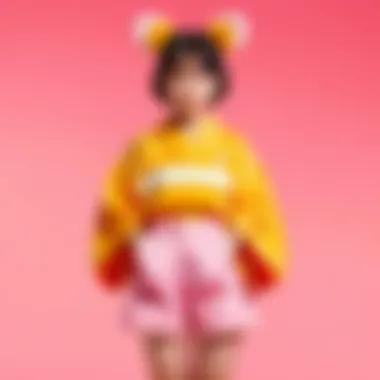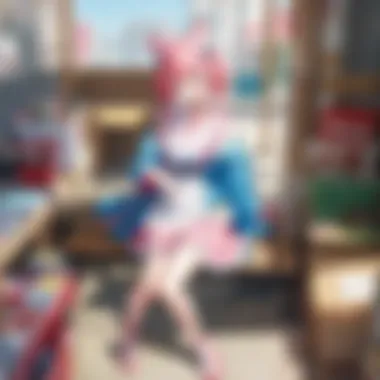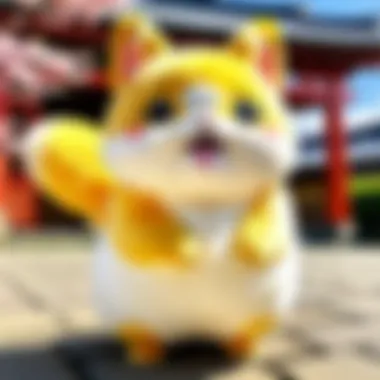A Deep Dive into Ebichu: Themes and Cultural Impact


Intro
Ebichu, a notable work in the realm of manga and anime, stands out for its unique narrative and memorable characters. Created by the talented Risa Itō, it explores the daily life of a pet hamster and her relationship with her owner. The series combines humor and poignant moments, making its impact resonate with a diverse audience. Its cultural significance within the landscape of Japanese media is profound, as it engages themes that reflect both personal and social dynamics.
This article aims to analyze Ebichu with depth, taking a closer look at its components. By examining the narrative structure, character development, and underlying themes, the reader will gain insight into what makes this series iconic. Ultimately, the exploration seeks to highlight Ebichu’s contributions and reception among audiences, from casual viewers to devoted fans.
Prelims to Ebichu
The topic of Ebichu holds significant relevance in the landscape of manga and anime. This unique series captures the nuances of daily life and interpersonal relationships with a distinctive blend of humor and critique. A detailed exploration of Ebichu enriches our understanding of its cultural impact and the ways it resonates with diverse audiences.
Origin and Creation
Ebichu, created by Rika Takashima, first appeared in the early 1990s. The manga was serialized in Fujin Gaho, a magazine known for embracing niche and unconventional works. The unique origins of Ebichu can be traced back to the desire to present a more relatable and comedic perspective on the mundane aspects of life. Unlike many contemporaries that focused on action or fantasy elements, Ebichu chose to center its narrative around a hamster and her daily experiences, challenging traditional storytelling in manga.
Overview of the Story
The core narrative of Ebichu revolves around an anthropomorphic hamster named Ebichu and her interactions with her owner. The story is simple yet profound; it highlights the day-to-day happenings that can often feel trivial. Through humor, Ebichu encounters various challenges, predominantly relating to her owner's romantic life and struggles. This relationship serves as a vehicle to explore broader themes such as friendship, loyalty, and the complexities of adult relationships.
The narrative style combines light-hearted anecdotes with deeper, reflective moments. This duality allows readers to not only enjoy the comedy but also to consider the underlying messages being conveyed. In doing so, Ebichu becomes more than just a slice-of-life story; it stands as a commentary on the human experience through the lens of a small creature.
Ebichu presents a rich tapestry of humor layered with real-life observations, a uniqueness that distinguishes it in the manga and anime realm.
Character Analysis
The significance of character analysis in understanding Ebichu is paramount. Characters are not merely vessels for the story; they embody thematic elements and provide deeper insights into the work’s cultural nuances. The examination of both the protagonist and supporting characters reveals the intricate dynamics that drive the narrative forward. This analysis allows readers to appreciate the motivations behind character choices and the broader implications of their actions within the context of societal norms.
Ebichu's Role and Personality
Ebichu, the central character, operates on multiple levels. As a hamster, she symbolizes innocence and a playful spirit. Her personality is marked by a blend of naivete and resilience, which often leads to comedic situations. This duality creates a relatable figure for audiences, as they see traces of their own perseverance reflected through her antics. Moreover, Ebichu's loyalty and dedication to her owner amplify the themes of friendship and dedication present throughout the series. These traits not only endear her to the audience but also serve as a critique of adult responsibilities and relationships.
Supporting Characters
Supporting characters play crucial roles in shaping the overall narrative of Ebichu. They often serve to highlight Ebichu's traits through contrast or conflict. Each character adds depth to the story and allows for a broader exploration of its themes.
Background of Supporting Cast
The supporting cast includes a mix of quirky and relatable characters that enrich the storyline. Characters like Ebisuzawa Kyouko showcase the tension between ambition and personal relationships. This dynamic serves as a commentary on modern life’s challenges, making the supporting characters a vital aspect of the narrative. Their complex backgrounds often shed light on societal expectations and underscore the absurdities of adult life.
The unique features of the supporting cast, including their diverse personalities and motives, enhance the storytelling experience. Each character represents a different viewpoint on the themes of love, friendship, and the pressures of adulthood, making them both beneficial and popular choices for this article. Exploring their backgrounds reveals the intricate web of relationships that sustain the narrative.
Character Relationships
The relationships among characters form the backbone of the Ebichu narrative. Ebichu’s bond with her owner exemplifies unconditional love and the support system often sought in friendships. The interactions among friends and rivals present multifaceted perspectives on loyalty and betrayal.


This focus on relationships allows for a deeper understanding of the emotional stakes within the series. It invites viewers to reflect on their own connections and how they shape their lives. The unique feature of these relationships lies in their realism; they are neither idealized nor wholly negative, contributing to a nuanced reading of the text. While the variety of character dynamics enriches the story, it can also create potential confusion for readers not attuned to these complexities.
"Character dynamics in Ebichu reveal not only personal growth but also societal reflections, making analysis crucial for deeper comprehension."
Through this detailed character analysis, readers gain significant insight into Ebichu's narrative depth and cultural resonance. This understanding makes the work more than just an entertaining series; it provides a lens through which to view human relationships and societal expectations.
Thematic Elements
Thematic elements serve as the backbone of any narrative. In the context of Ebichu, these elements provide depth, making the story resonate with audiences. This section focuses on various themes present in the series, illustrating how they contribute to the overall impact of the work. The themes explored hold significant relevance for discussions on modern relationships, humor, and societal norms.
Exploration of Humor in Ebichu
Humor in Ebichu is not merely for entertainment. It functions as a tool to explore deeper societal issues. The series employs absurdity and satire to highlight the absurd conditions often found in adult life. Through Ebichu’s innocent yet candid perspectives, the humor becomes a lens through which serious matters are examined. The jokes may come across as simple, but they often reveal complexities in human behavior.
By addressing everyday failures and misunderstandings, Ebichu creates a relatable setting for viewers. This connection through humor allows for a more genuine engagement with the themes of the series. Moreover, the humor acts as a buffer, making it easier for audiences to digest critical commentary on adult relationships.
Themes of Friendship and Loyalty
Friendship is a central theme in Ebichu. The relationships depicted showcase the dynamics of loyalty and support. Ebichu, subject to the whims and struggles of her owner, remains a symbol of unconditional love. This theme transcends the personal and taps into broader societal constructs about companionship. Often, the characters face challenges that test their commitment to each other. These narratives reflect real-life experiences where loyalty can be both a strength and a vulnerability.
This focus on friendship also highlights the importance of acceptance. Each character brings a unique identity to the story. Through their interactions, Ebichu emphasizes that friendship exists despite flaws and misunderstandings. The strength derived from these bonds stands as a poignant reminder of what it means to be loyal in contemporary society.
Critique of Adult Relationships
Ebichu takes a bold approach in critiquing adult relationships. It unveils the disillusionment often felt by individuals navigating the complexities of modern love. Through the experiences of the characters, the narrative addresses issues such as dependency, dissatisfaction, and miscommunication. For instance, the relationship between Ebichu's owner and her partners showcases not only the complexities of adult love but also the potential damage caused by societal expectations.
Furthermore, the series sheds light on the often messy nature of adult interactions. Characters represent different facets of adult life, revealing how relationships can be fraught with misunderstandings. This exploration invites the audience to reflect on their experiences with relationships. By placing these critiques within a humorous framework, Ebichu manages to present an honest portrayal while remaining accessible to its audience.
"In Ebichu, humor and critique intertwine to reveal the nuances of adult relationships, making the challenges relatable yet undeniable."
Overall, the thematic elements in Ebichu enrich the narrative, offering layered insights into human connection and societal expectations.
Visual Style and Art Techniques
Understanding the visual style and art techniques in Ebichu is critical to appreciating its unique aesthetic. The visuals serve not just as decoration, but as a fundamental part of the storytelling process. The way characters are drawn, the colors used, and the overall atmosphere of illustrations all contribute to the tone and message of the series. The choices made by the creator have a significant impact on how audiences perceive the emotions and themes present in each episode.
Artistic Influences
Ebichu draws upon various artistic influences from both traditional Japanese art and contemporary styles. The simplistic character designs reflect a minimalist approach, which is common in many anime and manga series. This choice allows the audience to focus on character actions and dialogue without being distracted by excessive details. The expressions of characters are exaggerated, which enhances the comedic elements of the story. Elements of kawaii culture are also evident, showcasing a trend of cuteness that resonates within Japanese media.
Additionally, the influence of past genres can be observed. For example, shoujo and shounen art styles have left their mark on the visuals, indicating how the series ties into broader cultural movements. Its character environments also draw on everyday settings, making the series relatable yet engaging. This balance of influences creates a unique visual language that contributes to the narrative.
Character Design Choices
Character design in Ebichu is distinctive and functional. Each character is deliberately crafted to express specific traits and emotions. Ebichu, the main character, has features that evoke innocence and playfulness. Her appearance supports her personality as a simple, lovable creature who embodies loyalty and mischief. Supporting characters contrast with her design, featuring more complex and often exaggerated traits that enhance their roles in the story.


The color palette plays a vital role as well. Pastel colors dominate, providing a soft and whimsical feeling to the visual experience. This choice echoes the tone of the narrative while ensuring that the more serious topics are not eclipsed.
"The art style of Ebichu not only attracts viewers but also communicates deeper themes embedded within its framework."
Moreover, character movements and expressions are designed to heighten comedic effects or to convey drama effectively. Quick transitions and dynamic poses capture the essence of the narrative flow. Thus, character design in Ebichu is not an isolated aspect but interwoven with the thematic and narrative fabric of the story.
In summary, the visual style and art techniques in Ebichu create a multi-layered experience that enhances the audience's connection to the narrative. By analyzing the artistic influences and character design choices, one sees how these elements elevate the series, making it a significant contributor to the anime and manga landscape.
Cultural Significance
The cultural significance of Ebichu cannot be overstated. This series has carved its niche within the manga and anime landscape, leaving a lasting impact on both genres. From its humor to its portrayal of relationships, Ebichu stands as an emblem of how anime and manga can reflect and critique real-life issues while entertaining audiences.
One key element of Ebichu’s significance is its subversion of traditional anime tropes. Unlike many series that focus on idealized characters and scenarios, Ebichu presents realistic, often flawed depictions of everyday life. This authenticity resonates deeply with viewers, providing a stark contrast to the more fantastical elements prevalent in other works. The series depicts the mundane aspects of life with humor, making it relatable and compelling.
Impact on Manga and Anime
The impact of Ebichu on manga and anime extends beyond its comedic value. It has encouraged both creators and consumers to explore themes often overlooked in mainstream narratives. Elements such as adult relationships, workplace dynamics, and real-life challenges are explored candidly. For instance, the interactions between Ebichu and her owner reflect a blend of humor and discomfort, showcasing a relationship that is both supportive and chaotic.
Moreover, Ebichu pioneered a style of visual storytelling that balances simplicity with expressive character design. This presents a unique approach that many creators have since adopted, contributing to a broader acceptance of different narrative styles in the manga and anime community.
Ebichu has also inspired a generation of manga artists and writers. Its success showcases that stories rooted in everyday experiences can garner just as much attention and appreciation as those in fantastical settings. The willingness to engage with complex emotional landscapes has made Ebichu a model for narrative complexity in manga.
"In portraying the humorous absurdities of adult life, Ebichu resonates with a demographic that is often underrepresented in both manga and anime."
Relation to Contemporary Issues
In terms of its relation to contemporary issues, Ebichu addresses themes of consumerism, societal expectations, and the complexities of modern relationships. The backdrop of everyday life in Ebichu serves not just as a setting but as a commentary on the pressures faced by millennials and Generation Z.
For example, the depiction of Ebichu's owner grappling with her own aspirations and disappointments reflects a broader narrative about succeeding in a fast-paced world filled with expectations. This authentic representation connects with younger audiences who find themselves navigating similar struggles.
Additionally, the series subtly critiques societal norms surrounding adult life—cohabitation, romantic partnerships, and even domestic responsibilities. These issues are presented in a light-hearted manner, making them accessible and easier to digest. Through sharp wit and relatable scenarios, Ebichu prompts viewers to consider their own lives and choices.
Furthermore, Ebichu highlights the dynamic between personal happiness and societal pressures, a theme that is increasingly relevant in today’s conversation about mental health and wellness. By presenting characters who tackle these challenges humorously, the series advocates for open discussions around topics that are often stigmatized.
Critical Reception
The Critical Reception section explores how Ebichu has been received by both audiences and critics. This topic is crucial as it provides insight into the cultural and artistic impact of the series. Analyzing the reception helps delineate what aspects resonated with viewers, thereby revealing the effectiveness of its themes and narrative structure.
Audience Reactions
Audience reactions to Ebichu play a significant role in defining its overall impact. Fans often express varied opinions based on their cultural backgrounds and personal experiences. The humor and themes of friendship and loyalty often appeal to viewers, resonating deeply on both personal and universal levels.
Reactions can be classified into several categories:


- Positive Responses: Many viewers appreciate the relatability of the characters and their experiences. They find the humor and light-hearted nature refreshing, providing an escape from reality.
- Critical Perspectives: Some audience members raise concerns about the portrayal of adult relationships, considering it inappropriate or exaggerated. This critique highlights the polarity of the viewer experience and suggests that perceptions of humor can be highly subjective.
- Mixed Reviews: A segment of the audience finds enjoyment in the animation style and storytelling but questions certain narrative choices. This indicates a nuanced reception where viewers appreciate elements while finding some parts lacking.
Online platforms, such as Reddit and social media, serve as spaces for fans to voice their opinions, creating vibrant discussions around themes and character dynamics. The collective narratives formed on these platforms shape ongoing conversations and allow insights into broader cultural contexts.
Critical Reviews and Commentary
Critical reviews of Ebichu provide a professional gaze into the series, often highlighting aspects that casual viewers may overlook. Critics typically analyze character development, thematic depth, and artistic style, offering a more formal evaluation of the series.
Several points emerge in critical commentary:
- Character Depth: Critics often note the layered nature of Ebichu’s character. The simplistic exterior hides a complex personality, allowing for interpretations that range from comedic to poignant.
- Artistic Choices: The visual presentation receives attention, with critiques focusing on the production quality and how it complements the narrative. Reviewers frequently highlight the effective use of bright colors and character designs that enhance storytelling.
- Cultural Context: Commentaries often delve into how Ebichu reflects contemporary societal issues within Japan. Critics frequently connect the themes of the series to larger conversations about adulthood, expectations, and relationship dynamics.
"The series, while humorous, serves as a mirror to societal norms, prompting discussions that extend beyond mere entertainment."
Comparative Analysis with Other Works
Understanding Ebichu in the context of other manga and anime is essential for appreciating its unique contributions to the medium. Comparative analysis allows us to uncover shared themes, character traits, and narrative techniques that resonate across various works. By examining these similarities and differences, one can gain a more nuanced understanding of Ebichu’s identity while recognizing its influence on other creators.
Similarities with Other Manga
Ebichu shares notable characteristics with other popular manga, particularly in its use of humor and relatable situations. For instance, the slice-of-life genre often incorporates comedy as a means to engage with everyday scenarios. This is evident in series like "Yotsuba&!" and "Nichijou." Both works focus on ordinary experiences yet elevate them through humor, much like Ebichu does.
The portrayal of quirky, endearing characters is another common thread. In Ebichu, the titular character embodies innocence and simplicity, reminiscent of characters found in works such as "Chi's Sweet Home" and "Doraemon." These series often depict the lives of animals or children, highlighting their interactions with adults. The innocence of Ebichu represents a larger commentary on adult life, paralleling the way these other manga navigate similar themes.
Additionally, the relationship dynamics in Ebichu mirror those present in series like "My Neighbor Totoro" or "Shoujo Shuumatsu Ryokou." These works explore companionship through both humor and emotion. In doing so, they emphasize the bond between characters and their surroundings, often providing a comforting escape from reality.
Contrasting Themes and Styles
While there are similarities, Ebichu also diverges from many other manga in its thematic focus and stylistic approach. For instance, Ebichu employs a distinctly irreverent humor that may not appeal to all audiences. This is evident when contrasting it with the more heartfelt narratives found in "One Piece" or "Your Name." Those series often deal with grand themes of adventure, love, and sacrifice. In contrast, Ebichu challenges social norms and adult relationships through a lens of absurdity.
Another key distinction lies in its animation style and character design. While many popular manga adopt a polished visual approach, Ebichu's art is more straightforward and deceptively simplistic. This choice is deliberate. The rough edges reflect the rawness of its themes and provide a stark contrast to the intricate styles often employed in series like "Attack on Titan" or "Death Note."
In essence, while Ebichu may find itself paralleling other works, it also positions itself as a unique entity that explores less conventional subjects. This difference offers a refreshing perspective on adult themes, which often go unexamined in other popular titles.
"Comparative analysis enriches our understanding of Ebichu, showcasing its unique identity while highlighting the interconnectedness of themes within the manga landscape."
By evaluating Ebichu alongside its peers, readers may discover hidden layers and insights that deepen their comprehension of not just this series but the broader genre as a whole.
Finale
The conclusion of this article encapsulates the profound exploration of Ebichu and its implications on both individual viewers and the broader cultural landscape. It shines a light on the uniqueness of the series, which blends humor with poignant themes surrounding relationships and societal expectations. The analysis presented here highlights key aspects that make Ebichu worthy of study, providing insights that resonate with manga and anime enthusiasts.
Final Thoughts on Ebichu's Legacy
Ebichu has carved out a distinctive place in the realm of manga and anime. Its legacy is not just defined by its humor but also by its ability to tackle complex themes such as loyalty, friendship, and the often ironic nature of adult life. While the whimsical presentation may suggest lighthearted entertainment, the underlying critiques prompt audiences to reflect on their own lives and relationships. The show also challenges traditional narratives often found in mainstream media, making it significant in its own right.
As fans look back at Ebichu, the fondness for its relatable characterizations remains strong, signifying that its impact transcends boundaries of casual viewing. Fans appreciate how the series provides both amusement and substance, which may explain its lasting influence.
Future Prospects for Similar Works
The success of Ebichu paves the way for similar works that blend humor with deeper themes. As audiences continue to desire content that resonates on multiple levels, creators are likely to explore this blend more. Works that do not shy away from portraying the complexities of adult life are gaining traction.
- Storytelling Innovations: Future manga and anime could adopt unique narrative styles, inspired by Ebichu, to discuss relationships and societal issues without losing humor.
- Character Depth: Audiences will likely seek characters that reflect real-life complexities, providing both comic relief and critical perspectives on life.
- Cultural Reflections: As society evolves, the portrayal of contemporary issues through anime will become increasingly relevant, with a focus on narrative strategies akin to those found in Ebichu.
The future looks promising for works that draw inspiration from established classics while forging new paths. Such works will not only entertain but also spark dialogue among viewers.



